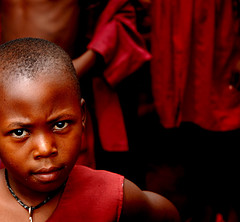 Nigeria has known only one decade of an elected government since it left the British Empire in 1960, until President Olusegun Obasanjo was elected to office in 1999. He was reelected in 2003. Obasanjo has promised reforms, but a culture of greed and corruption runs deep.
Nigeria has known only one decade of an elected government since it left the British Empire in 1960, until President Olusegun Obasanjo was elected to office in 1999. He was reelected in 2003. Obasanjo has promised reforms, but a culture of greed and corruption runs deep.Religion: Christian 52.61%, Muslim 41.00%, Traditional ethnic 5.99%, and non- Religious/other 0.40%
Ideological Influence: Islam
Head of State: President Olusegun Obasanjo, a committed Christian, has wisely and tactfully moved to bring about change while endeavoring to preserve national unity. The former ruling elite have put forth efforts to frustrate and discredit his administration.

Persecution: Islam has been given preferential treatment over Christianity in the past. Shariah Law has been implemented in 12 of Northern Nigeria’s predominately Muslim states. Christian leaders are hopeful Obasanjo’s government will continue to crack down on Muslim fanaticism. In 2005, violence against Christians continued. Believers were killed; churches, Christian schools, homes and businesses were burned and destroyed. The government in the past has turned a blind eye.
 Missionary Opportunity: The church in Nigeria is strong, but there is concern over the rise of foreign cults and the mixing of Christianity with the country’s traditional fetish beliefs. Nigeria has become one of the major missionary-sending countries of the developing world.
Missionary Opportunity: The church in Nigeria is strong, but there is concern over the rise of foreign cults and the mixing of Christianity with the country’s traditional fetish beliefs. Nigeria has become one of the major missionary-sending countries of the developing world.
No comments:
Post a Comment